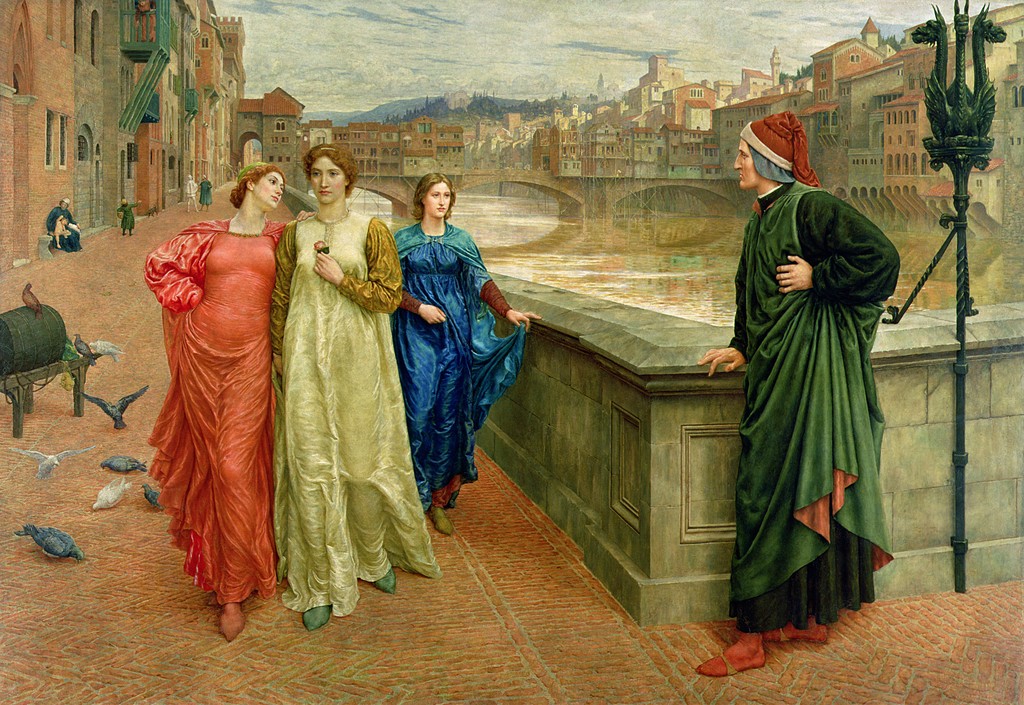by Jane Blanchard
Beatrice, Dante Alighieri’s second guide in La Divina Commedia (The Divine Comedy), makes her literary debut in an earlier work, La Vita Nuova (The New Life), a combination of prose and poetry that details his encounters with the girl, and then the woman, who became his muse. Dante was about nine years old when he first spotted Beatrice Portinari, slightly younger than himself, during a gathering at her father’s palazzo in Florence. Dressed in a crimson gown, she stole his heart, but from a distance, for they never spoke on this occasion. From then on, Dante tried to catch glimpses of Beatrice around town; after nine years, in all-white attire and in the company of two older ladies, she finally greeted him on the street. He was so thrilled that he began to dream and to write about her.
These writings reveal that Dante felt as much pain as pleasure in the presence or even in the proximity of Beatrice, and they also indicate that he endured some teasing as a result. By this point, Beatrice was not only the embodiment of love, but also the epitome of the unapproachable and unattainable beloved. At the age of twenty-one, though, Dante entered a long-arranged marriage, as was common in medieval Florence. Soon afterwards, Beatrice entered her own long-arranged marriage; she died only three years later, but she continues to be immortalized in Dante’s works.
Many of the poems in La Vita Nuova are sonnets in the emerging Italian language and style, including the following one:
For certain he has seen all perfectness
who among other ladies has seen mine:
they that go with her humbly should combine
to thank their God for such peculiar grace.
So perfect is the beauty of her face
that it begets in no wise any sign
of envy, but draws round her a clear line
of love, and blessed faith, and gentleness.
Merely the sight of her makes all things bow:
not she herself alone is holier
than all; but hers, through her, are raised above.
From all her acts such lovely graces flow
that truly one may never think of her
without a passion of exceeding love.
This piece, translated into English in the nineteenth century by Dante Gabriel Rossetti, shows well the virtue that Beatrice possesses, expresses, and inspires. She is so lovely and so good that those around her do not “envy” her; instead, they admire her, emulate her, and “thank . . . God” for her. Such sentiments derive from the courtly poetry of troubadours driven from southeastern France by the Albigensian Crusade early in the thirteenth century, a few decades before Dante was born. These sentiments continue in the sonnets written by Francesco Petrarca (Petrarch) during the Italian Renaissance of the fourteenth century, and they persist even in those written by Philip Sidney during the English Renaissance of the late sixteenth century.
A native Virginian, Jane Blanchard lives and writes in Georgia. Her second collection, Tides & Currents, like her first, Unloosed, is available from Kelsay Books.
Discover more from Society of Classical Poets
Subscribe to get the latest posts sent to your email.
















To emulate virtue is such a powerful and beautiful concept – thank you.
It was such a forlorn love that it’s innocence created a gracious and beautiful purity. Thank you.
A well written essay about Dante’s greatest muse. The Vita Nuova is underappreciated, I think, especially given its important relationship to the Divine Comedy. I hope your concise summary of the book, its literary influences, and its impact on literature will influence others to read it for themselves. I’m also glad you posted Rossetti’s translation of one of the sonnets; it is very beautiful. What a feat to be able to translate Dante’s sonnets and keep the rhyme scheme, when they are so self-contained and carefully worded. Thanks for posting this.